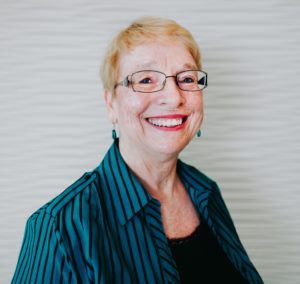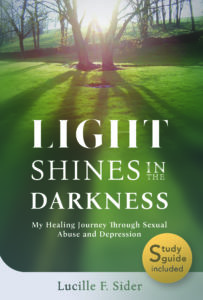Lucille F. Sider is an ordained minister called to bring healing to others even as she carried dark, painful secrets inside her for decades.

Lucille F. Sider
Those secrets were a complex weaving of sexual abuse and toxic religion that came to be expressed through the symptoms of undiagnosed depression.
A big step toward clarity came with a painful divorce, the eventual arrest and imprisonment of one of her abusers and what she describes as the grace and energy of God to discover a process for ongoing healing.
And now Sider, 72, wants her experience to work to the good of others, beginning with the publication of her memoir Light Shines in the Darkness: My Healing Journey Through Sexual Abuse and Depression.
The new book opens with a theme-setting quotation from Maya Angelou: “There is no greater agony than baring an untold story inside you.”
From there, Sider sets out to demonstrate the truth of that statement in her life and to share how a combination of traumatic events, and the divine guidance to learn from them, guided her from darkness into light.
“That story began at 6 years old when I was sexually abused and I didn’t tell anybody about it,” the Chicago resident told told Baptist News Global. “Then I was sexually abused at 15 years old by my brother-in-law.”
Sider was born in Canada into a Brethren in Christ family, where horrific events such as sexual abuse were not discussed.
In the ensuing years she sought solace through spiritual and educational development. After undergraduate studies she attended Yale Divinity School, was ordained by an independent Congregational church, then pursued a doctorate in the psychology of religion from Northwestern University. She has served Presbyterian churches in various pastoral capacities and embarked on a career as a clinical psychologist and pastoral counselor.
‘I have stabilized’
Then at 50, an unexpected divorce.
“I fell into a deep depression and lost my career,” she said. “It turns out I had been living with some depression my whole life from sexual abuse as a child and adolescent.”
At age 64, Sider’s second abuser, her brother-in-law, was arrested for another assault. The case included previous victims, including Sider, testifying about their abuse.
“It was in that testimony that I finally told my story,” she said.
It was when transparency combined with faith to commence deep healing.
“At first I was shaky and so on, but then there became a point when I was very calm and I felt I was transported spiritually to a different place,” she said.
“I was there in the room but I was almost out of my body. I was with other women who were suffering their entire lives. I became radiant. I was being held by Jesus,” she said. “That’s how transforming it was.”
There was more to come.
In 2012, a friend wanted to produce a one-woman show about Sider’s experiences. It required Sider writing about her experiences.

“I said yes, but I didn’t know how to write it,” she said.
They consulted a professor who writes and performs one-woman shows.
“When she heard my story she said you need to write a book, first,” Sider said. “I was stunned. My son said it will help you heal.”
Sider said she experienced the healing process as a calling to help other victims of sexual assault to find their own journeys out of the darkness.
One confirmation of that inspiration came with the rise of the #MeToo movement around the time she was looking for a publisher for her manuscript.
“When that happened, I said wow. And the publisher said this book is authoritative and timely,” she said. “I experience it as a calling that God prepared me over many years to do.”
The movement, she added, is immensely important to victims of abuse still grappling with secrecy and shame. For many of them, it may provide the first clue they are not suffering alone.
“If you know there are sisters out there who have gone through this, you’re encouraged,” Sider said.
Her next step will be speaking engagements based around her memoir and an accompanying workbook and website.
One of her goals will be to emphasize that no two people are alike in how they heal from abuse. Sider said she continues to struggle with PTSD.
“I never say I have recovered from sexual abuse. I say I have stabilized,” she said. “I do not want dear sisters and brothers to think I have it all together and have them think they should be able to, too.”
Beginning with surrender
Sider attributes her continued healing to a combination of therapeutic and spiritual practices.
One includes weekly therapy.
“I will not be surprised if I will do this my entire life.”
She’s also involved in dream work to understand the workings of her unconscious mind.
Sider said she also meditates twice a day.
“I begin the day with surrender to God with meditation, and I end my day with surrender.”
Nature, including being surrounded by potted plants, plenty of exercise and hobbies also keep her stable.
“I go to church faithfully,” she added. “I am moved in church.”
Another part, and perhaps the hardest for Sider, was forgiveness.
It began for her when she received a letter from her brother-in-law asking forgiveness. Sider said she rejected the idea but was encouraged to consider it by another relative.
“That’s when the whole forgiveness idea started to work on me,” she said. “I’m a Christian. Jesus said love your enemies.”
Later she attended a retreat where participants sang a hymn about there being a place at God’s table for young and old, male and female “and the just and the unjust, and that there was a time for mercy,” she said. “That started working on me.”
At another retreat she had a mystical experience in which she encountered Christ and saw herself as connected by the light of God to her brother-in-law, then in prison, and to her sister.
“After that I felt that I should write a forgiveness letter and that’s where the book ends, with that letter.”
Sider said she isn’t suggesting that abuse victims must forgive their abusers. But for her it was important and underscores the role of the divine in healing from her abuse.
‘Forgiveness is from God’
Ministers can play an important role in that process, she said, if they listen carefully to survivors of abuse and take them very seriously.
“And they need to understand that this won’t go away, that this has to be dealt with in the church,” she said.
Sider suggested ministers accompany survivors to therapy or court hearings if appropriate.
It’s also about “understanding the nature of abuse, walking beside the survivor and also walking beside the predator,” Sider added. “The predator needs a great deal of companionship.”
But survivors need to be given the room to heal in their own ways, she added.
“I would likely have never come to forgiveness on my own,” she said. “I think the openness to forgiveness, and the energy needed to forgive, is from God.”
